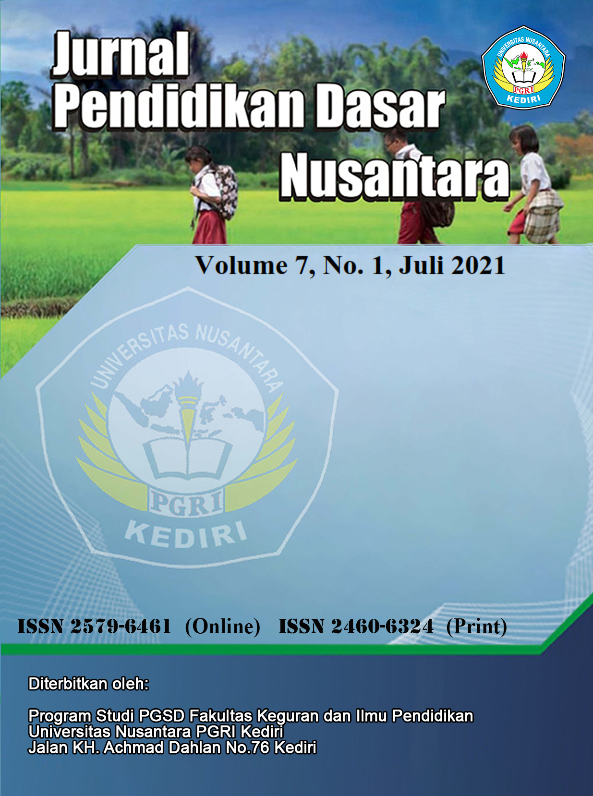Implementasi Program Literasi Melalui Pemberian Bingo Card Untuk Menumbuhkan Minat Baca Pada Siswa Kelas III SDN Selorejo II
DOI:
https://doi.org/10.29407/jpdn.v7i1.15656Keywords:
literacy programs, bingo card, reading interest.Abstract
The purpose of this study to (1) describe the implementation of literacy programs by giving a bingo card to develop a reading interest in class III SDN Selorejo II, (2) describe interest in student III SDN Selorejo after a bingo card. The study uses qualitative approach research procedures with descriptive types of qualitative research. This research’s data and data covers primary and secondary data sources. The data-collecting techniques used were interviews, questionnaires, and documentaries. The data analysis techniques performed in this study through data reduction, data presentation, deduction drawing. The validity of data testing techniques ran through triangulation, and surveillance persistence. Research results entitled show that; (1) implementation of literacy programs through a bingo card to develop a reading interest in class III SDN Selorejo II, done on a three-stage basis; (a) the breeding stage, done by having student do with a 15-minute lesson from various media; (b) the development stage, made through a gift of bingo cards that scented students select question cards that read B, I, N, G, O in the available pouch; (c) the learning stage, students work on the questions on the cards that have been drawn. Students win prizes when they gather the letter B, I, N, G, O. (2) interest in reading students after a bingo card, it is known to experience considerable growth. This is evident from what students did not want to read to want to do a reading activity up to 3-4 story titles because of the challenge on the bingo card.
Downloads
References
Abidin, Yunus, Tita Mulyati dan Hana Yunansah. 2017. Pembelajaran Literasi: Strategi Meningkatkan Kemampuan Literasi Matematika, Sains, Membaca, dan Menulis. Jakarta: Bumi Aksara.
Ahmadi, Farid & Hamidulloh Ibda. 2018. Media Literasi Sekolah: Teori dan Praktik. Semarang: CV. Pilar Nusantara.
Antoro, Billy. 2017. Gerakan Literasi Sekolah: Dari Pucuk Hingga Akar Sebuah Refleksi. Jakarta: Direktorat Jenderal Pendidikan Dasar dan Menengah Kementrian Pendidikan dan Kebudayaan.
Budiharto, Triyono, & Suparman. 2018. Literasi Sekolah Sebagai Upaya Penciptaan Masyarakat Pebelajar Yang Berdampak Pada Peningkatan Kualitas Pendidikan. Ilmu Sejarah, Sosial, Budaya Dan Kependidikan, 5(1), 153–166.
Dharma, K. B. 2013. Implementasi Gerakan Literasi Sekolah dalam Menumbuhkan Minat Membaca Siswa di Sekolah Dasar. Journal of Chemical Information and Modeling, 53(9), 1689–1699. https://doi.org/10.1017/CBO9781107415324.004
Ghony, M. Djuanidi & Fauzan Almanshur. 2012. Metodologi Penelitian Kualitatif. Jogjakarta: Ar-Ruzz Media.
Hastuti, S., & Lestari, N. A. 2018. Gerakan Literasi Sekolah: Implementasi Tahap Pembiasaan Dan Pengembangan Literasi Di SD Sukorejo Kediri. Jurnal Basataka (JBT), 1(2), 29–34.https://doi.org/10.36277/basataka.v1i2.34
Hendrayanti, A. 2018. Peningkatan Minat Baca Dan Kemampuan Membaca Peserta Didik Kelas Rendah Melalui Penggunaan Reading Corner. Jurnal Penelitian Pendidikan, 17(3), 235–248.
Kemendikbud. 2019. Desain Induk Gerakan Literasi Sekolah. Jakarta: Direktorat Jendral Pendidikan Dasar dan Menengah Kementerian Pendidikan dan Kebudayaan.
Kusumaningrum, Vincentia Retno. 2019. Hubungan Program Gerakan Literasi Sekolah Dengan Minat Baca Dan Kemampuan Berfikir Kritis Siswa. Skripsi. Fakultas Keguruan dan Ilmu Pendidikan. Yogyakarta: Universitas Sanata Dharma. Diakses pada 10 Agustus 2020. http://repository.usd.ac.id/35280/2/141324018_full.pdf .
Maharani, O. D., Laksono, K., & Sukartiningsih, W. 2017. Minat Baca Anak-Anak Di Kampoeng Baca Kabupaten Jember. Jurnal Review Pendidikan Dasar : Jurnal Kajian Pendidikan Dan Hasil Penelitian, 3(1), 320. https://doi.org/10.26740/jrpd.v3n1.p320-328
Malawi, Ibadullah, Dewi Tryanasari, dan Apri Kartikasari. 2017. Pembelajaran Literasi Berbasis Sastra Lokal. Magetan: CV. Ae Media Grafika.
Mulyati, Yeti, dkk. 2016. Bahasa Indonesia. Tanggerang Selatan: Universitas Terbuka.
Mutia, P., Atmazaki, & Nursaid. 2018. Implementasi aktivitas literasi di sma negeri batusangkar. Jurnal Pendidikan Bahasa Dan Sastra Indonesia, 7(3), 257–266.
Ruslan, & Wibayanti, S. H. 2019. Pentingnya Meningkatkan Minat Baca Siswa. Prosiding Seminar Nasional Pendidikan Program Pascasarjana Universitas PGRI Palembang 12 JANUARI 2019, 767–775.
Salma, A., & Mudzanatun. 2019. Analisis Gerakan Literasi Sekolah Terhadap Minat Baca Siswa Siswa Sekolah Dasar. MIMBAR PGSD Undiksha, 122–127.
Setiawan, Roosie & Sofie Dewayani. 2019. Seri Manual GLS Variasi kegiatan 15 menit Membaca di Sekolah. Jakarta: Direktorat Jenderal Pendidikan Dasar dan Menengah Kementerian Pendidikan dan Kebudayaan.
Suyono, Harsiati, T., & Wulandari, I. S. 2017. Implementasi Gerakan Literasi Sekolah Pada Pembelajaran Tematik Di Sekolah Dasar. Suyono Titik Harsiati Ika Sari Wulandari Universitas, 26(2), 116–123.
Sudarsana, Undang & Bastiano. 2017. Pembinaan Minat Baca. Tanggerang Selatan: Universitas Terbuka.
Downloads
Published
Issue
Section
License
Authors who publish with this journal agree to the following terms:
- Copyright on any article is retained by the author(s).
- The author grants the journal, the right of first publication with the work simultaneously licensed under a Creative Commons Attribution License that allows others to share the work with an acknowledgment of the work’s authorship and initial publication in this journal.
- Authors are able to enter into separate, additional contractual arrangements for the non-exclusive distribution of the journal’s published version of the work (e.g., post it to an institutional repository or publish it in a book), with an acknowledgment of its initial publication in this journal.
- Authors are permitted and encouraged to post their work online (e.g., in institutional repositories or on their website) prior to and during the submission process, as it can lead to productive exchanges, as well as earlier and greater citation of published work.
- The article and any associated published material is distributed under the Creative Commons Attribution-ShareAlike 4.0 International License

































